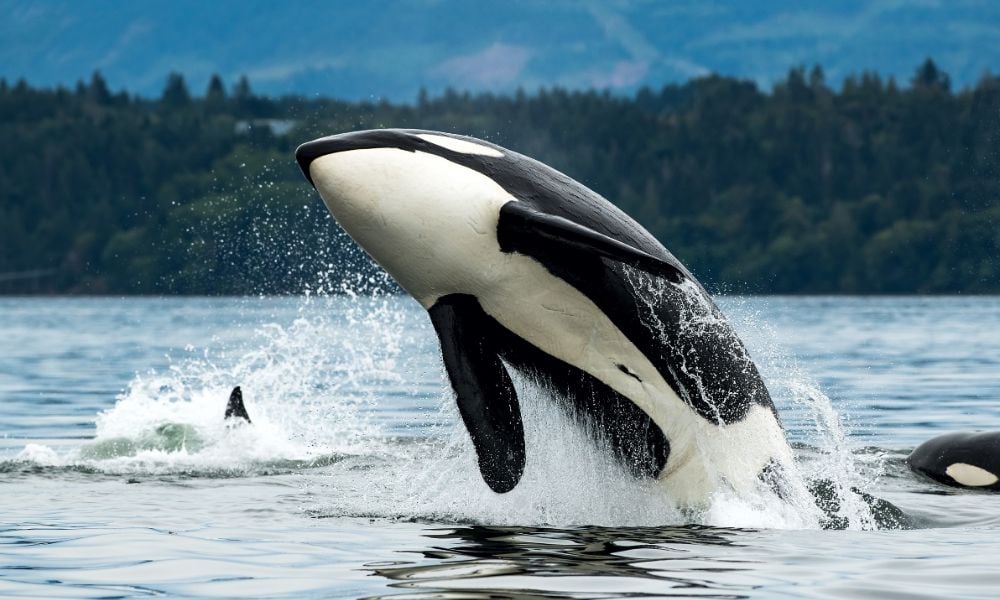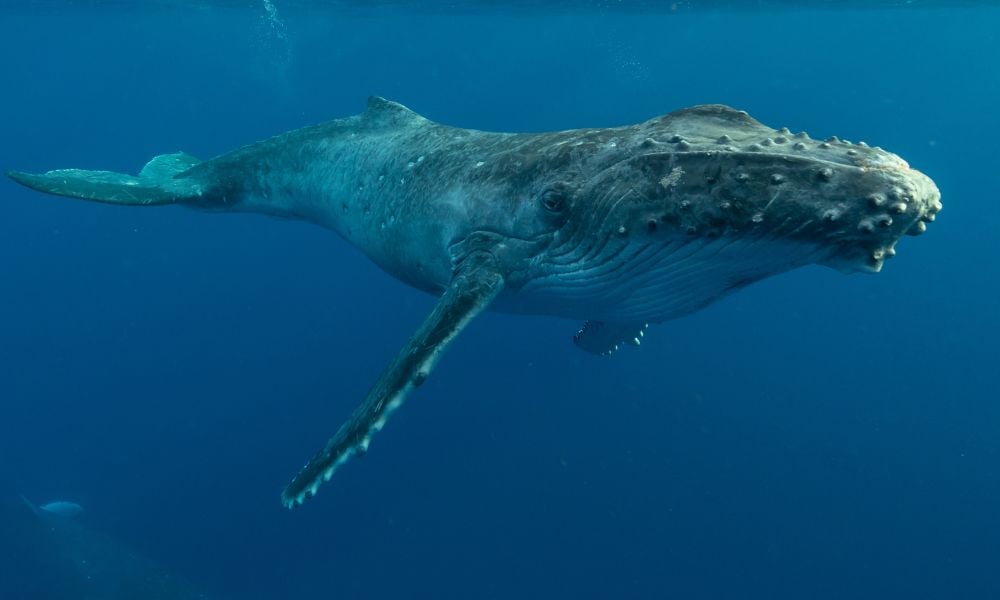Sound artist and ocean conservationist Joshua Miller is using music to help save the whales.
“Save the whales” became the slogan of the anti-whaling movement of the 1970s – possibly inspired by an album called “Songs of the Humpback Whale” which was released the first year of the decade. The tranquil sounds of whales singing inspired people around the world to speak up for the majestic animals – including Joshua Miller.
Miller told Lady Freethinker that hearing their unique sounds inspired him to learn more about their underwater habitat. Now, Miller is combining music and research to advocate for whales and ocean conservation.
Whales “sing” to communicate. Their songs tend to be extremely complex – with some species appearing to have developed a “culture” of pod-specific vocalizations according to recent research. Recordings of sperm whale songs even appear to show that they make decisions as groups after discussing different options.
Miller is hoping to raise awareness about whales and ocean conservation with a unique project called Sounds of the Ocean. He hopes that the “conversations” he has with whale song recordings and his own instruments in his album will inspire in listeners a more emotional connection.
“Art can help make the research of marine biologists more accessible,” Joshua Miller told Lady Freethinker in an interview. His latest art project, Sounds of the Ocean, “would not exist without the research from top scientists, engineers and activists at the Monterey Bay Aquatic Research Institute,” Miller said.
Since the 1970s, whaling has declined as many countries – including the U.S. – have banned the inhumane hunt and many species have been recognized as endangered. Sadly, some countries still allow the commercial hunting of whales.
Japan made news recently by announcing plans to increase commercial whale hunts to target fin whales – five years after leaving the International Whaling Commission.
“It is very important that these species do not wind up on the menu of fancy restaurants,” Miller said in response to this news. “We must keep the pressure on governments and businesses to demand that these species are left alone as their extinction will threaten the entire food chain in the ocean, leaving catastrophic effects that could last many generations,” Miller added.
Whales still face many other unique threats in addition to being hunted – including entanglement in fishing gear.
“Our fishing industry today contributes to the death of many marine creatures by leaving nets in the ocean, which then become ripe for creatures like whales to get tangled and die,” Miller said. The endangered North Atlantic right whale is one of the species at particular risk from entanglement. Whales who are injured in fishing gear may also tragically die years later due to the injuries.
There are only about 360 North Atlantic right whales left in the world – and the number is likely to continue declining as they have been experiencing what experts call “an unusual mortality event” since 2017. Collisions with ships have been documented to result in the deaths of many of these endangered whales. They are additionally impacted, as all whales are, by climate change.
Bottom trawling nets from fishing vessels pose a deadly danger not only to whales, but to all sea life. These fishing nets drag across the bottom of the ocean floor killing indiscriminately – just last year a shocking number of orcas were found dead in trawling gear in Alaska.
Ships also produce sound pollution — and for an animal whose communication is so dependent on hearing each other, this is a problem. The grey whale travels farther than any other mammal during their migration, so being unable to clearly hear which direction they need to swim could spell disaster for these endangered whales. The beluga whale, who uses echolocation to navigate and feed, are also hurt by sound pollution from ships.
With several incredible, unique whale species facing threats of extinction, whale conservation is just as urgent now as ever.
Whales are deeply intelligent animals. Lady Freethinker encourages everyone to help save the whales by never visiting marine parks that keep these wild animals in captivity, by choosing compassionate plant-based options in lieu of fish, and by speaking up for legislation that protects them and their wild ocean homes.
Miller spoke with Lady Freethinker about the significance of whales and ocean conservation, whale songs, and how we can all help save the whales.
To learn more, listen to highlights from their recent performances at the 2023 United Nations Climate Change Conference (COP28) on their website here.
The following Q&A has been edited for length.
Q + A with Joshua Miller
There are millions of different species living in the ocean. What makes whales so important?
Whales are important to the ocean for many reasons. They are a natural carbon sink, which means that they actually can remove carbon from the atmosphere. In fact, in New Zealand, a whale was just granted legal rights, so that when a whale gets killed by a shipping vessel, for example, they can be held responsible.
For me, whales are special because they are the most vocal creatures in the ocean. So, as a musician I find them particularly interesting.
Why should humans be concerned about what happens to the ocean?
The ocean is our best defense against climate change — with its ability to regulate temperature and key levels of acidity, pH and other metrics. Plus, it’s absolutely beautiful and just deserves to be protected. I want my future kids to be able to experience the same beauty that I could see as a child.
We really should be asking: “Why are humans NOT concerned about the health of the ocean?”
It is a critical habitat. We must protect these waters from terrible ideas like deep-sea mining, bottom trawling fishery, and oil and gas exploration because these practices alone will really mess up the underwater ecosystem — which will then affect all of us on land.
Can you tell us more about whale songs and how they are threatened by human activity?
Whales communicate over great distances underwater in an absolutely incredible way. They seem to have their own mystical language and way of expressing themselves, which has been of interest to humans for thousands of years.
Unfortunately, over the last 200 years, we as humans have wiped out a very large portion of whales globally, which as we know now affects the entire food chain of the ocean environment. My hope is that all countries put a ban on commercial whaling operations and leave these creatures alone.
I recently heard the whales myself while scuba diving in Hawaii and was absolutely mesmerized by the amount of whale song present in these sacred waters. Each year, Humpbacks come to Maui to mate, give birth and raise their calves. If we interfere with these ancient rituals, then these whales won’t be able to communicate with each other and continue the evolution of their species. I certainly don’t want to be part of a system responsible for the systematic extinction of whales, do you?
How are whales affected by plastic litter in the oceans?
Whales, sharks, dolphins, turtles, birds and pretty much every other species we love, is affected by microplastics. The natural forces of wind, tide and swell can transport one item of plastic for thousands of miles to the most remote parts of the ocean.
The challenge with plastic is that it never goes away, and it is still much cheaper to produce new plastic than recycle what we have already created. Of course, regulation and policy makers can have an effect here, but it is not enough. We need to get the business men and women responsible for plastic production to understand and care about the effect of their mass production.
But, unless the consumer puts pressure on brands, venues and governments to go plastic-free there will always be a business model to supply us with plastic materials.
If we stopped using plastic today completely, that would be the best thing we could do for our environment, including the whales and millions of other species.
Are there any signs of hope for the future of whales and ocean conservation?
Yes, compared to 100 years ago, we are in a much better globally aligned place to defend whales and dolphins. There are far fewer cetaceans in captivity and many more countries who have outlawed this barbaric practice. We still have more work to do, but we are headed in the right direction!
Over the past 5-years of doing this work, meeting so many younger people who care about the ocean has given me positive reassurance that change is possible. In the most remote areas and unexpected countries where life can be really hard like Egypt or Guatemala, there exists a deep love for nature and desire to protect our planet. It is this global community that keeps me going and inspired to continue on my path to share the magic of the ocean with the world.
Is there anything you’ve learned about whales in your advocacy that has surprised you?
I was surprised to hear that our ships can really disturb the whales ability to communicate with each other. We can solve this by protecting more critical areas of the ocean and keep global shipping lanes limited to certain areas to help keep the ocean quiet.
So what can we do to help save the whales?
We can all reduce our consumption of plastic, choose the most sustainable means of travel, eat less fish and meat, and put pressure on government leaders to protect marine habitats. Additionally, we can donate to plastic removal campaigns and talk about how much we love whales!
Is there anything else you’d like to share with our readers?
Please enjoy some music on our website which features humpback, blue and sperm whale sounds, combined with music to help you relax at: www.soundsoftheocean.com. Thank you!








